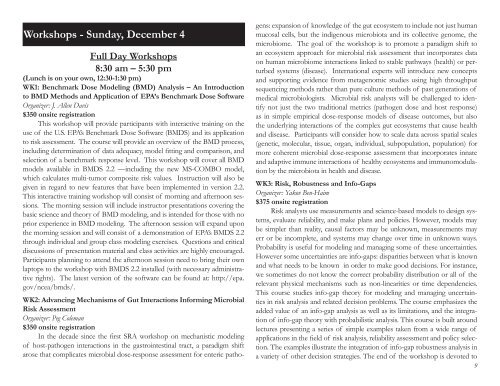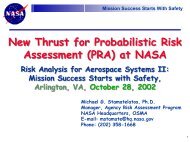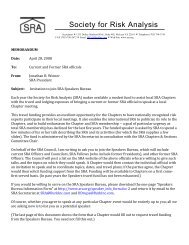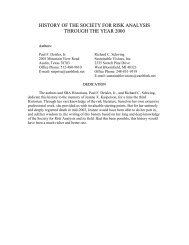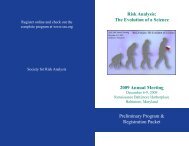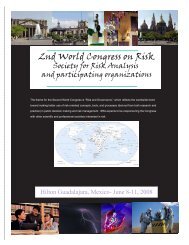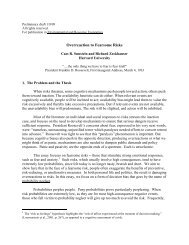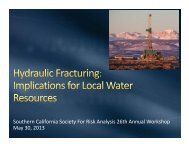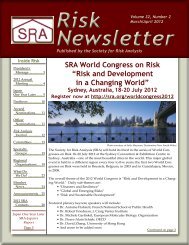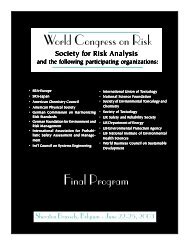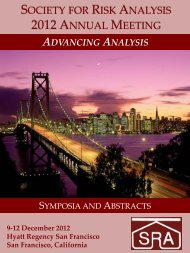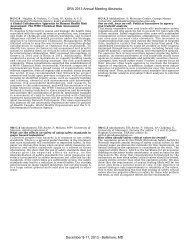Final Program - Society for Risk Analysis
Final Program - Society for Risk Analysis
Final Program - Society for Risk Analysis
Create successful ePaper yourself
Turn your PDF publications into a flip-book with our unique Google optimized e-Paper software.
Workshops - Sunday, December 4Full Day Workshops8:30 am – 5:30 pm(Lunch is on your own, 12:30-1:30 pm)WK1: Benchmark Dose Modeling (BMD) <strong>Analysis</strong> – An Introductionto BMD Methods and Application of EPA’s Benchmark Dose SoftwareOrganizer: J. Allen Davis$350 onsite registrationThis workshop will provide participants with interactive training on theuse of the U.S. EPA’s Benchmark Dose Software (BMDS) and its applicationto risk assessment. The course will provide an overview of the BMD process,including determination of data adequacy, model fitting and comparison, andselection of a benchmark response level. This workshop will cover all BMDmodels available in BMDS 2.2 —including the new MS-COMBO model,which calculates multi-tumor composite risk values. Instruction will also begiven in regard to new features that have been implemented in version 2.2.This interactive training workshop will consist of morning and afternoon sessions.The morning session will include instructor presentations covering thebasic science and theory of BMD modeling, and is intended <strong>for</strong> those with noprior experience in BMD modeling. The afternoon session will expand uponthe morning session and will consist of a demonstration of EPA’s BMDS 2.2through individual and group class modeling exercises. Questions and criticaldiscussions of presentation material and class activities are highly encouraged.Participants planning to attend the afternoon session need to bring their ownlaptops to the workshop with BMDS 2.2 installed (with necessary administrativerights). The latest version of the software can be found at: http://epa.gov/ncea/bmds/.WK2: Advancing Mechanisms of Gut Interactions In<strong>for</strong>ming Microbial<strong>Risk</strong> AssessmentOrganizer: Peg Coleman$350 onsite registrationIn the decade since the first SRA workshop on mechanistic modelingof host-pathogen interactions in the gastrointestinal tract, a paradigm shiftarose that complicates microbial dose-response assessment <strong>for</strong> enteric patho-gens: expansion of knowledge of the gut ecosystem to include not just humanmucosal cells, but the indigenous microbiota and its collective genome, themicrobiome. The goal of the workshop is to promote a paradigm shift toan ecosystem approach <strong>for</strong> microbial risk assessment that incorporates dataon human microbiome interactions linked to stable pathways (health) or perturbedsystems (disease). International experts will introduce new conceptsand supporting evidence from metagenomic studies using high throughputsequencing methods rather than pure culture methods of past generations ofmedical microbiologists. Microbial risk analysts will be challenged to identifynot just the two traditional metrics (pathogen dose and host response)as in simple empirical dose-response models of disease outcomes, but alsothe underlying interactions of the complex gut ecosystems that cause healthand disease. Participants will consider how to scale data across spatial scales(genetic, molecular, tissue, organ, individual, subpopulation, population) <strong>for</strong>more coherent microbial dose-response assessment that incorporates innateand adaptive immune interactions of healthy ecosystems and immunomodulationby the microbiota in health and disease.WK3: <strong>Risk</strong>, Robustness and Info-GapsOrganizer: Yakov Ben-Haim$375 onsite registration<strong>Risk</strong> analysts use measurements and science-based models to design systems,evaluate reliability, and make plans and policies. However, models maybe simpler than reality, causal factors may be unknown, measurements mayerr or be incomplete, and systems may change over time in unknown ways.Probability is useful <strong>for</strong> modeling and managing some of these uncertainties.However some uncertainties are info-gaps: disparities between what is knownand what needs to be known in order to make good decisions. For instance,we sometimes do not know the correct probability distribution or all of therelevant physical mechanisms such as non-linearities or time dependencies.This course studies info-gap theory <strong>for</strong> modeling and managing uncertaintiesin risk analysis and related decision problems. The course emphasizes theadded value of an info-gap analysis as well as its limitations, and the integrationof info-gap theory with probabilistic analysis. This course is built aroundlectures presenting a series of simple examples taken from a wide range ofapplications in the field of risk analysis, reliability assessment and policy selection.The examples illustrate the integration of info-gap robustness analysis ina variety of other decision strategies. The end of the workshop is devoted to9


